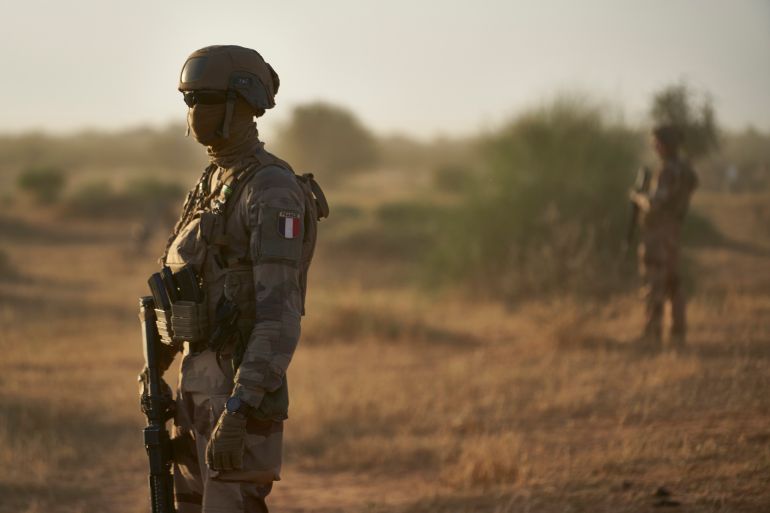France ‘to reduce troop presence’ in Sahel
Paris to withdraw several hundred troops to make way for stronger European presence in conflict-hit region, sources say.

Less than a year after sending hundreds of extra troops to the Sahel, France is hoping to cut back its military presence in the restive region to make room for a stronger European commitment, army sources say.
Foreign Minister Jean-Yves Le Drian and defence minister Florence Parly visited Mali in quick succession in the last weeks to help the government assess the French presence in the Sahel, the sub-Saharan region where thousands of troops have been stationed since 2014 as part of the Barkhane force.
Keep reading
list of 4 itemsGabriel Attal becomes France’s youngest prime minister
Macron says protecting civilians ‘non-negotiable’ at Gaza aid conference
Macron visits Kazakhstan on strategic tour of Central Asia
“We are getting close to the end of the year, a natural point to assess our progress,” Parly said during her visit.
President Emmanuel Macron said over the summer months that France would restructure Barkhane by the end of the year.
According to multiple military sources who spoke to AFP and asked not to be named, France would like to withdraw several hundred troops from its current 5,100-strong contingent.
This would take it back to levels deployed before a surge in activity in January when rising numbers of attacks prompted a boost in the French troop presence.
The defence ministry declined to comment on any troop cutting plans.
‘Singularly weakened’
Barkhane has scored some major victories in cooperation with its local partners, notably against the Islamic State in the Greater Sahara (ISGS) group in the border region between Mali, Burkina Faso and Niger.
ISGS is now “singularly weakened”, Barkhane commander General Marc Conruyt said, “although we have to remain vigilant”.
Experts say one major vulnerability exploited by fighters is the inability of many central governments in the region to secure and supply far-flung territories after a military victory.
Often they cannot provide protection, education and basic services, leaving local populations to fend for themselves, including against any resurgence by armed groups.
Another group, the al-Qaeda-affiliated Group to Support Islam and Muslims (GSIM), has meanwhile taken advantage of the French focus on ISGS to build up its own strength.
“They are now the most dangerous enemy for Mali and the international forces,” Conruyt said.
Fifty French soldiers have died in the Sahel since 2013, sparking some soul searching at home about the cost of the conflict.
“Seven years later, the situation is not evolving favourably on the ground, despite our great tactical successes,” French deputy Thomas Gassilloud warned Parliament, calling the cost of the Sahel operation “great, too great”.
To lighten the load, France is hoping for more military support from its European partners through the Takuba Task Force which assists Mali in its fight against armed groups.
Soldiers from Estonia participated in a mission last month and a Czech contingent is expected shortly, joined by Swedes in 2021.
“France was alone for a long time, but it is no longer alone,” said Parly. “I’m very optimistic that we’re now going to shift gears,” she said.
France is also hoping its African partners in the region will be able to handle their own security once the worst of the threat has been removed by the foreign alliance.